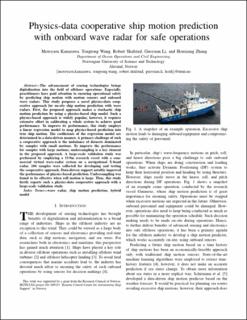Physics-data cooperative ship motion prediction with onboard wave radar for safe operations
Chapter
Accepted version
Permanent lenke
https://hdl.handle.net/11250/3114902Utgivelsesdato
2023Metadata
Vis full innførselSamlinger
Originalversjon
http://dx.doi.org/10.1109/ISIE51358.2023.10228113Sammendrag
The advancement of sensing technologies brings digitalization into the field of offshore operations. Especially, practitioners have paid attention to ensuring operational safety by predicting ship motion with motion sensors and onboard wave radars. This study proposes a novel physics-data cooperative approach for on-site ship motion prediction with wave radars. First, the proposed approach makes a stochastic ship motion prediction by using a physics-based ship model. Such a physics-based approach is widely popular, however, it requires extensive effort in calibrating a whole system to achieve good performance. To improve its performance, this study employs a linear regression model to map physics-based prediction into true ship motion. The coefficients of the regression model are determined in a data-driven manner. A primary challenge of such a cooperative approach is the imbalance of datasets dominated by samples with small motions. To improve the performance for samples with large motions, undersampling is a key element in the proposed approach. A large-scale validation study was performed by employing a 33.9m research vessel with a commercial virtual wave-radar system on a navigational X-band radar. 104 samples were collected for developing and testing the cooperative approach. Data-driven support notably improved the performance of physics-based prediction. Undersampling was found to be effective when roll motion is large. Thus, this study firstly reports such a physics-data cooperative approach with a large-scale validation study.

